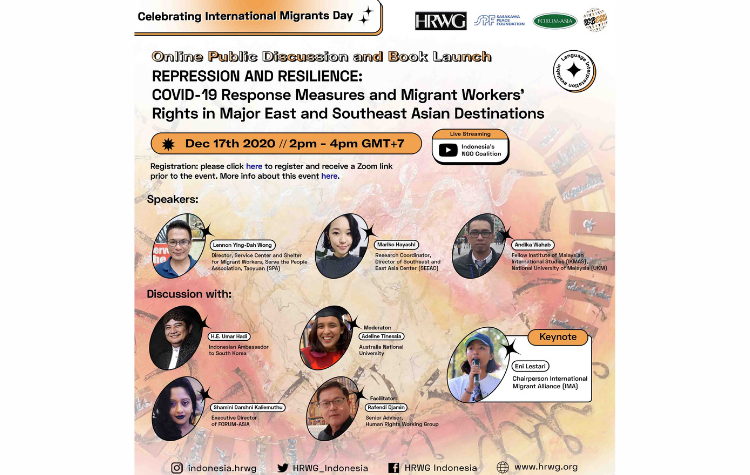Online Public Discussion and Book Launch
Repression and Resilience: COVID-19 Response Measures and Migrants Workers in Major East and Southeast Asian Destinations
Thursday, December 17 2020, 2-4 PM Western Indonesia Time
Online on Zoom
Click here to register

About the Discussion:
The pandemic has emphasised on border controls, as countries use travel bans and restrictions to protect their own population from the virus entering into their borders. It can be mandated by each country’s constitution, allowing them to focus on protecting and serving their own citizens, however at a time of crisis, it may gear up the use of politics based on sectarian populism or nationalism.
Migrant workers globally have become one of the most vulnerable and disproportionately affected groups from the socio-economic consequences of the COVID-19 pandemic, and who are faced with the greatest risk of coronavirus infection. Temporary, low-wage and/or undocumented migrants have limited or no access to healthcare, information, daily necessities and personal protective equipment (PPE), poorer occupational safety and health, lack of physical distancing in employer-provided housing and lack of firewalls and fears of arrests and detention, therefore their rights to health is unfulfilled. This is despite the fact that migrant workers play an especially crucial role in the fight against COVID-19, such as in care and frontline settings. The discrimination that migrant workers faces has been exacerbated by the pandemic. Migrant workers are also suffering the economic ramifications due to the pandemic’s effect on the global economy.
Joined by scholars and experts of civil society organisations working on the frontline to address the challenges faced by migrant workers, this study aims to 1) assess the impact of pre-existing migration policies and COVID-19 public health measures, often based on strong national interests, on migrant workers, 2) explore how vulnerabilities translate to real-life experiences of migrant workers, and 3) how state and non-state actors, including businesses and civil society, are dealing with challenges faced by migrant workers. This research is also aimed at amplifying voices of those who are affected and bringing them to the multi-stakeholders at the national and regional levels.
This research is part of an initiative of civil society actors in both East and Southeast Asia to work collaboratively to address issues faced by an increasing number of migrants moving cross-regionally.
Keynote, Speakers and Discussants:
- Eni Lestari, Chairperson International Migration Alliance (IMA)
- Mariko Hayashi, Research Coordinator, Director of Southeast and East Asia Center
- Andika Wahab, Fellow Institut Malaysian and International Studies (IKMAS), University Kebangsaan Malaysia (UKM)
- Lennon Ying-Dah Wong, Director, Service Center and Shelter for Migrant Workers, Serve the People Association, Taoyuan (SPA)
- H.E. Umar Hadi, Indonesian Ambassador to South Korea
- Shamini Darshni Kaliemuthu, Executive Director of Forum-ASIA
Moderator and Facilitator:
- Adeline Tinessia, Australia National University (ANU)
- Rafendi Djamin, Senior Advisor Human Rights Working Group
About the organisers:
- The Asian Forum for Human Rights and Development (FORUM-ASIA)is a Bangkok-based regional network of 81 member organisations across 21 Asian countries, with consultative status with the United Nations Economic and Social Council, and consultative relationship with the ASEAN Intergovernmental Commission on Human Rights. Founded in 1991, FORUM-ASIA works to strengthen movements for human rights and sustainable development through research, advocacy, capacity-development and solidarity actions in Asia and beyond. It has sub-regional offices in Geneva, Jakarta, and Kathmandu. forum-asia.org
- The Indonesian NGOs Coalition for International Human Rights Advocacy (HRWG) was established by several NGOs working on different issues but shared common interest in human rights to serve the need for elaborate advocacy works already in place with the aim of maximising the goals and putting more pressures on the Indonesian government to execute its international and constitutional obligations to protecting, fulfilling, respecting and promoting human rights in the country. hrwg.org
***
Please click here to learn more about this event




